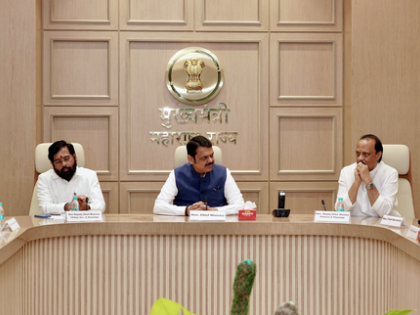Maha’s mega energy move: 38 GW green capacity, 7 lakh jobs
By IANS | Updated: May 12, 2025 18:47 IST2025-05-12T18:40:59+5:302025-05-12T18:47:40+5:30
Mumbai, May 12 Maharashtra is spearheading India’s clean energy revolution under Chief Minister Devendra Fadnavis’ leadership with an ...

Maha’s mega energy move: 38 GW green capacity, 7 lakh jobs
Mumbai, May 12 Maharashtra is spearheading India’s clean energy revolution under Chief Minister Devendra Fadnavis’ leadership with an ambitious plan to add 38 GW of renewable capacity by 2030.
The Chief Minister’s office in a post on X on Monday said, “Backed by Rs 3.3 lakh crore in investments and 7 lakh new jobs, the state is blending affordability with sustainability. This is more than a transition, it’s a blueprint for inclusive, green growth!”
The CMO quoted the article written by the Energy Department's Additional Chief Secretary Abha Shukla.
“India’s electricity demand is rising rapidly.
It added that as India’s largest industrial and power-consuming state, Maharashtra is expected to witness a 6.5 per cent annual increase in power demand. That translates to a requirement of more than 280 billion units of electricity by 2030, with peak demand jumping from the current 29 GW to 45 GW — a scale comparable to that of major European nations.
To meet this challenge, Maharashtra has formulated a practical, future-ready energy transition plan. Its goal is clear: affordable electricity, clean energy, and sustainable growth.
At the heart of this transition is a strong push for 38 GW of renewable energy (16 GW distributed RE for agriculture) with storage (pump storage and distributed battery storage ), solar and wind hybrid energy, with tariff commitments as low as Rs 2.54 per unit for solar energy. This is not just a clean energy initiative — it is also a cost-saving move.
Lower production costs mean cheaper power for industries, which in turn enhances their global competitiveness. It is a smart economic strategy cloaked in environmental foresight.
The broader transition plan is expected to attract investments worth Rs 3.3 lakh crore by 2030. Significantly, 75 per cent of this investment will be within Maharashtra and will be largely driven by the private sector. This scale of capital infusion promises to reshape the energy ecosystem and, in turn, the economy, it said.
For India to remain competitive in the global energy and manufacturing markets, it must deliver power that is not just clean but also affordable and reliable.
Maharashtra recognises this. By focusing on lower input costs through clean energy, the state is creating an environment where both MSMEs and large industries can thrive.
In addition, the state’s investments in transmission networks and energy storage infrastructure are aimed at reducing wastage and ensuring that every unit of generated renewable power is efficiently utilised. These steps are critical to making the grid stable, attracting private participation, and preventing the kind of power curtailment issues seen in some developed markets like Germany, it said.
Disclaimer: This post has been auto-published from an agency feed without any modifications to the text and has not been reviewed by an editor
Open in app